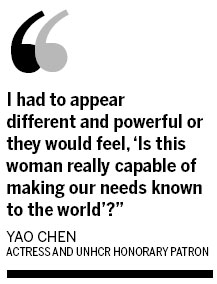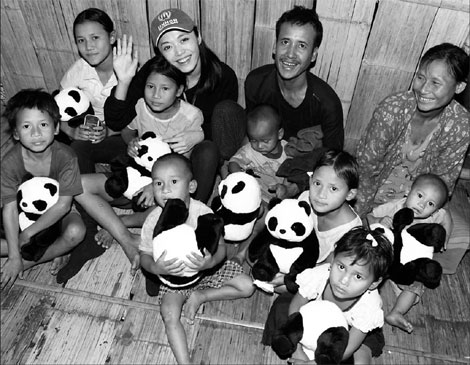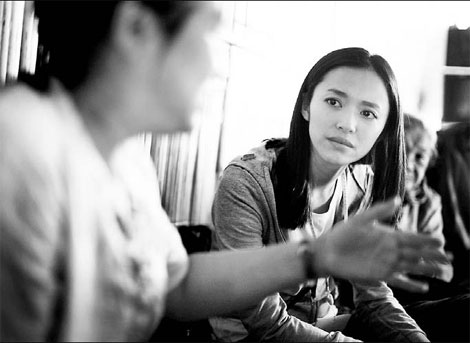Reaching out to refugees
|
Naw Roza (far right), her husband Saw K'Lu and their children are among the approximately 45,000 refugees in Mae La, northern Thailand. Photos provided to China Daily |
Actress Yao Chen's humane self comes to the fore as the first Chinese honorary patron of the United Nations High Commissioner for Refugees (UNHCR). Han Bingbin reports.
Actress Yao Chen, the first Chinese honorary patron of the United Nations High Commissioner for Refugees (UNHCR), credits another actress, Hollywood's Angelina Jolie, for joining the world body. Jolie was appointed global honorary patron of the UNHCR in 2001. Yao says Jolie's 10-year devotion to refugee affairs dramatically changed her impression of the star.
So when the UNHCR approached her in 2010, Yao had no hesitation in accepting.
The UN body had earlier been turned down by several other Chinese celebrities.
Yao's agent Zhang Lei says the fact that the celebrity is personally responsible for all costs and receives no accident insurance, could be a possible reason.
Like Jolie, Yao's main task is to visit refugees worldwide and call for their recognition. So far, she has visited refugees in Hong Kong, and in countries such as the Philippines and Thailand.
It has been a valuable learning experience, she says.
Yao says she used to associate refugees only with poverty. What often came to mind were victims of natural disasters, she says. But in the camps she saw people whose lives were a lot more complicated.
Yao visited the Mae La camp in northern Thailand, bordering Myanmar, where the refugees told her in a calm voice why they fled their home country.
There are approximately 45,000 refugees in Mae La, nearly 29,000 registered and an estimated 16,000 who are unregistered.
Although they are not allowed to step out of the camp, all their basic needs are taken care of in Mae La.
The camp distributes monthly rations of food and oil to each family. Education and healthcare is also free. But without a legal local identity, many of them have no hopes of landing a decent job.
Despite the hardships, "you can hardly see hatred on their faces The toilets and bamboo buildings are so clean," Yao says.
"I was deeply moved by their dignity."

When Yao visited, she took along gifts, snacks and toys, but soon realized material comforts were far from their minds.
Their refugee tag leaves them feeling embarrassed, Yao says, adding they feel forgotten by the world, like they don't exist. What they seek is respect.
But this strong desire for respect also makes them extremely sensitive to outsiders. Yao says she had to be careful about not appearing to put up a show of sympathy and found that being an attentive listener made them more receptive to her.
The actress says it was also important for her to bring a message of hope. Hence, despite being advised against it, she would always dress up before going into the camps.
"They had been told a movie star was coming to visit them. I had to live up to their expectations," she says cheerily.
"I had to appear different and powerful or they would feel, 'Is this woman really capable of making our needs known to the world'?"
Her efforts paid off. Many refugees who were bashful initially, opened up to her, and were even unwilling to part. As Yao left, Naw Roza, a Christian, clasped her hand and said: "I hope God will bring you back to us."
Yao posted her touching encounters with the refugees on her microblog every day, and many of the messages attracted more than 1,000 comments.
While she received much effusive praise, including from Kitty Mckinsey, spokesperson for the UNCHR in Bangkok, she also got flak for ignoring "Chinese refugees".
"That just shows how ignorant people are of what 'refugee' means," she says.
Stung by the criticisms, Yao wanted to quit but then began to think of the others involved in such endeavors.
Like Mckinsey. The journey from Bangkok to the Mae La refugee camp takes seven hours. McKinsey, who is in her 50s, went to the camp ahead of the others and then returned to join them, only to make sure the journey was safe.
Yao also thought of a young mother who works at the UNHCR's Hong Kong office. A graduate of the prestigious University of Hong Kong, she could have found a much more financially rewarding job in the city like many of her former classmates. But she chose to follow her ideals.
"When I though of what these people have done for the refugees, I found my confidence returning," she says.
On June 20, Yao extended her stint with the UNHCR for another year, joking she might even make it a lifetime contract.
|
Yao Chen says being an attentive listener made refugees more receptive to her. |
(China Daily 08/06/2011 page11)
















